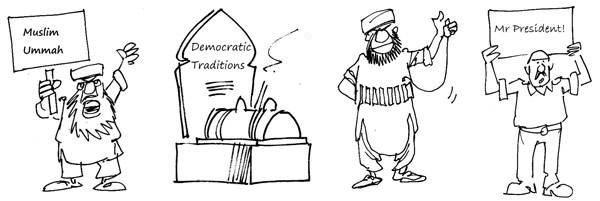
Patrons of terror – I

Sir,
Most of the statements made by politicians after an indication by the government that it would launch an operation against terrorism were pre-emptive, aimed at saving their own lives from the Taliban.
Khyber Pakhtunkhwa Chief Minister Pervez Khattak’s statement seemed to be aimed at appeasing the Taliban rather than reflecting ground realities. Imran Khan made a similar statement while talking to reporters. Maulana Fazlur Rehman said the government should immediately announce a ceasefire and give tribal jirgas a chance to negotiate. “The use of force is not going to bring peace to Pakistan,” he said while addressing a protest rally in Peshawar.
He seems to want the government to declare a ceasefire and let the criminals, militants and terrorists continue killing our soldiers and civilians.
Now that the government has announced it will negotiate with the Taliban, both the Maulana and Imran Khan have declined to become part of a committee nominated by the Taliban to negotiate on their behalf.
These politicians are playing for both sides. Their double-speak and double-game are the real cause of our troubles. If they take a clear stance, they fear the Taliban would eliminate them. They seem to have diverted the Taliban’s wrath towards the Nawaz government now.
Hamza Ali,
Dera Ismail Khan.
Patrons of terror - II
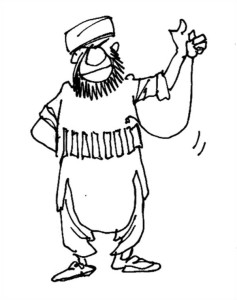
Sir,
As part of its wider strategy to combat extremism and militancy, the Nawaz government was reportedly planning a targeted operation against banned outfits in the country’s settled areas, including Punjab where the Lashkar-e-Jhangvi and Sipah Sahaba operatives and leaders have been allegedly enjoying shelter under the nose of the Punjab government.
The decision was welcomed by people from all walks of life and schools of thought. But the government did not announce when it would begin the operation, and there are no indications whether it will actually take place or not. The government has recently started negotiations with the Taliban, but will that also mean turning a blind eye to sectarian and other terrorists hiding in our urban centers? Ahmed Rashid, the author of Descent to Chaos, fears such a decision is not being made because of its impact on the so-far peaceful Punjab.
The government needs to adopt a strategy of preemption so that it can take prior measures to stop or handle the fallout in urban areas, especially of Punjab. But an operation cannot be stopped on this pretext, as if it is permissible to inflict casualties in other areas at the hands of terrorists and banned outfits. The fact remains that the members and leaders of these organizations are hiding in the urban areas. Those who are in Waziristan or other tribal areas are there for the purpose of training.
We cannot afford to patronize them any more because they and their acts are against the interests of the state. They must be declared enemies of the country. It may not be the case that they are being patronized, but the delay in an operation against them strengthens suspicions.
Fozia S Niazi,
Mianwali.
Patrons of terror – III
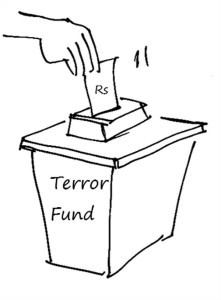
Sir,
The problem of the Taliban is in fact of our own creation. Our clerics are exploiting this issue to make money and gain influence. The solution lies in cutting them down to size.
Mosques and madrassas should be run by the Auqaf Department under the supervision of a well-educated board. All the money owned by unregistered mosques and madrassas should be confiscated and given to the Auqaf Department for the upkeep of the upkeep of mosques and madrassas they run.
Clerics get most of their funding from paltry businessmen, who exploit the poor in crooked ways to generate their wealth in the day, and then at night they frighten themselves with the thought of how they will defend their action on the Day of Judgment. To compensate, they fund the clerics.
What we are seeing in Pakistan is the greed for wealth trumping the goodness of honesty.
Terrorism needs to be eliminated, but please make a plan to eradicate the causes of terrorism, extremism and sectarianism. That discourse is a difficult one and requires long term planning, but we don’t have any other options.
Marya Mufty,
Lahore.
Price to pay
Sir,
When international fuel prices rise, our Finance Ministry and Ministry of Petroleum promptly increase petroleum prices in Pakistan.
The unfortunate reality that stares at us in the face is that the finance minister, representing a government headed by a businessman politician, has proven by refusing to lower the prices, proven that they have no sympathy for the common people of Pakistan.
This is a government during whose tenure there has been a record increase in duty and tax refunds for exporters and traders, although there has been hardly any substantial increase in exports. It is a government, like its predecessor, whose heart melts when it comes to big investors and even those involved in smuggling expensive limousines, and has no hesitation in granting them waivers.
The FBR continues to issue SROs to favor the elite, the latest being the grant of tax relief to airline pilots drawing salary in excess of Rs 700,000 per month, but we have no funds to increase the salary of doctors or teachers in service of government. The federal government continues to follow tax evasion policies of their predecessors, resulting in a widening gap between the rich and the poor, even refusing to increase profits on National Savings Schemes, serving widowers, pensioners or disabled, to the level that existed in 2008. Massive inflation has resulted in a 60 to 90 percent increase in food prices and utility bills in the last few years.
The government does not hesitate to take over fertile agricultural land from small landholders for construction of housing schemes or other industrial estates, despite the fact that our agricultural produce has reduced drastically.
S Khalil,
Sialkot.
Fuel to fire
Sir,
The gas companies have imposed additional security deposits of several thousand rupees on every consumer, on the assumption that all law-abiding consumers, including those paying gas bills regularly for over 20 years, will be defaulters some day and disappear. These state-owned companies will collect Rs 14 billion through this practice. The Oil and Gas Regulatory Authority has approved it. The suppliers of electricity, water and other services may now follow suit, hurting the common man even more.
Individual consumers cannot afford to seek justice in courts when facing these rich state owned companies.
In a democracy, people’s representatives are expected to look after the interest of common citizens. Our worthy parliamentarians and the minister for petroleum should examine this concept of extracting money from helpless consumers.
M Akram Niazi,
Rawalpindi.
Powers of president
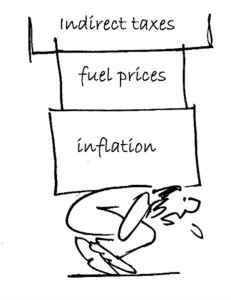
Sir,
Last year, during the 99th Senate session on December 20, there was a debate on the political and security situation in the country with particular reference to violence in Balochistan, FATA and Rawalpindi.
The motion, which was earlier moved by Senator Raza Rabbani, under the Rule 218 of business, to discuss the insurgency in FATA was consequently taken up. He urged President Mamnoon Hussain to take immediate measures to restore peace and security in the region.
Senator Raza Rabbani quoted clause 2 of Article 247 of the constitution, which says the president may from time to time give such directions to “the governor of the province to exercise powers of his function to enforce peace and security in the region or any part of a Tribal Area”.
He stressed the dire need for “peace and good governance” in FATA, under Article 247, clause 5, and urged the president to take adequate steps. The leader of the house, Raja Zafarullah Haq, said he would convey the “sentiments of the House” to the president.
Senator Raza Rabbani expressed concern after the 100th Senate session that there was no follow up. On January 15, he led an opposition walkout over what he called the government’s non-serious attitude towards legislative business and addressing the problems at large. Even the problem of terrorism could be tackled in a joint session of parliament instead of an all-parties conference, he said.
On January 20, the president used his power to prorogue the session. But the question that needs to be asked is, why can’t he use his power under Article 247 as well?
Kanwal Abidi,
Karachi.
Corrigendum
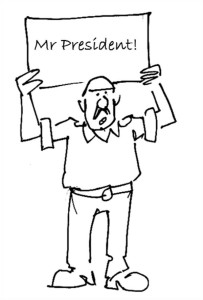
Sir,
Reference your article “King without a throne” in the Friday Times Jan 31-February 6th 2014, the name of my grandfather was Khansaib. His name was never Abdul Jabbar. Dr Khansaib was the elder brother (by 17 years) of Abdul Ghaffar Khan.
In the first half of the article the writer describes Abdul Ghaffar Khan as Dr Khansaib’s elder brother. In the second half of the article, the writer describes Dr Khansaib as the older brother.
Dr Khansaib was the first native to be the Medical Officer of the Guides Regiment. He was chief minister of the NWFP, chief minister of West Pakistan, and a federal minister.
If my grandfather’s name was Abdul Jabbar, he would have used it.
Shamim S Khan,
Lahore.
For the people
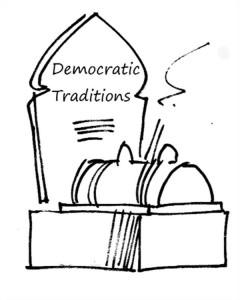
Sir,
According to the 1973 Constitution, Pakistan is a parliamentary democracy, where an elected government is answerable to representatives of the people sitting in the parliament.
What we are unfortunately witnessing is the desire of our elected prime minister to act like a constitutional monarch, or head of government in a presidential form of government, making an occasional ritual appearance in the National Assembly, abstaining from it for extended periods of time, as if his stature would be lowered by regularly attending parliamentary sessions.
The prime minister derives his powers from the constitution after being elected to the parliament, and proving his majority as the Leader of House.
In the UK – the mother of parliamentary democracy – the prime minister is present in the House of Commons every Wednesday as long as the house is in session, and addresses the Question Hour, which is broadcast live. It is the president of Pakistan who is required to address a joint session of parliament once every year, just like the Queen does in UK.
In America, where there is a presidential form of government. The president is neither a member of the legislature, nor is his tenure in office dependent upon the approval of a majority of the legislators. He is indirectly elected by the citizens through an electoral college, and can be removed by impeachment only.
Since 1913, he addresses a joint session of the House of Representatives and the Senate to deliver his annual message.
Why should Prime Minister Nawaz Sharif be hesitant to attend the National Assembly regularly at least once a week, when the parliament is in session? Other than reasons of health, democratic traditions require his frequent presence in the National Assembly.
Malik Tariq Ali,
Lahore.
More Arab than Arabs

Sir,
We Pakistanis aspire to an Arab identity instead of taking pride in our own culture. This is perhaps linked to our emotional attachment with religion, which often prevails over our nationalism.
When we come across people from Arab countries, we express emotions of utmost respect for our brethren. Those feelings are not always reciprocated. But we do not seem to want to change.
The Arabs cannot understand how we can be sincere to them when we are so insincere and dishonest towards our own country. The world is not the same place it used to be. People identify with their nation states and keep their national interests supreme.
Iran’s former president Hashmi Rafsanjani struck a strategic deal with India, which indirectly and directly proved to be detrimental for Pakistan – the brotherly Muslim neighbor of Iran. For us, late Yasser Arafat was an icon of Palestine’s independence struggle that we equate with the Kashmir struggle. But he too was more inclined towards India than Pakistan. He used to visit New Delhi very often and make statements that were against Pakistan’s stance on Kashmir. We, on the other hand, physically involve ourselves in wars or struggles of other Muslim countries even if that is detrimental to our own national interests.
According to latest reports, Saudi Arabia is going to sign a defense cooperation pact with India, during the visit of Crown Prince and Defence Minister Salman Bin Abdulaziz to New Delhi next month. Saudi Arabia is also India’s largest oil provider and hosts a large number of expatriate Indians. Indian Finance Minister P Chidambaram, who held talks with the Crown Prince during his two-day stay in the Saudi capital, said the Kingdom and India “have been able to make significant progress in relationship over the past few years.” The two sides have also resolved to “enhance cooperation in exchange of information relating to terrorist activities…” This cooperation is in the national interest of India and Saudi Arabia, and there is nothing wrong with it.
The lesson we must draw from this is that Pakistanis should not compromise on their national interests either. We are Pakistanis, first and foremost.
FZ Khan,
Islamabad.

